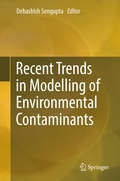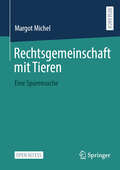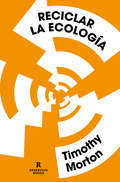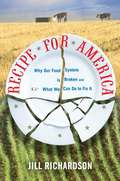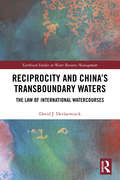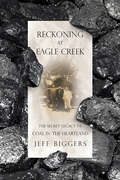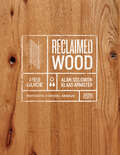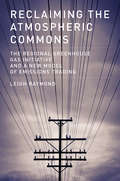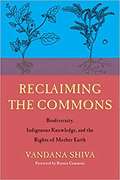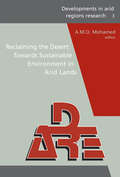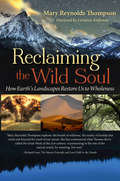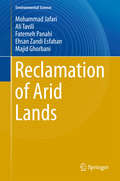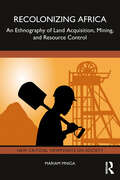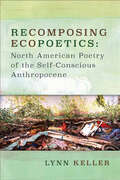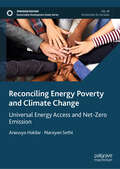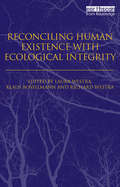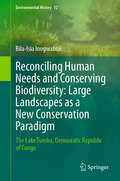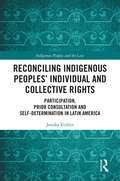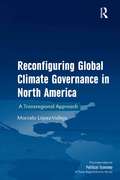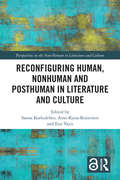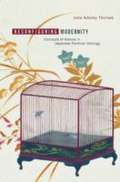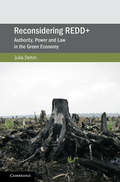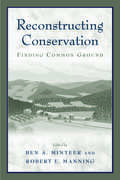- Table View
- List View
Recent Trends in Modelling of Environmental Contaminants
by Debashish SenguptaThe book deals primarily with the aspects like energy resources and its proper utilization, disposal of various forms of wastes and its effects and effects of major catastrophic events like nuclear disasters, global warming, etc. It also deals with the choice of suitable disposal sites for solid and hazardous waste, which is growing at an extremely rapid pace due to rapid industrialization, population growth (primarily in countries like India and China) and urbanization. In addition groundwater contamination due to various causes and its effect on the food chain is also amply discussed. The book is specifically aimed with the state-of-art information regarding research and development in these areas of study, coupled to extensive modelling and case based results obtained, both from India as well as other countries. The book is extremely instructive for the students, research workers, scientists, faculty members in Applied Physics, Solid Earth Geophysics, Radiometric Methods and Exploration, Ground Water Geochemistry, Mathematical Modeling Techniques in Earth Sciences, Near Surface Geophysics and Earth and Environmental Sciences.
Rechtsgemeinschaft mit Tieren: Eine Spurensuche
by Margot MichelDieses Open-Access-Buch fragt, ob die alten Begründungen, mit denen Tiere traditionell aus der Rechtsgemeinschaft ausgeschlossen wurden, noch tragen und zeigt, welche Fragen sich heute stellen.Die Grenzen der Rechtsgemeinschaft sind brüchig geworden und werden gegenwärtig neu verhandelt. Welche Konzepte prägen das Recht im Hinblick auf Tiere und wie sind aktuelle Entwicklungen einzuordnen? Das Buch wandelt auf den Spuren, die Tiere hinterlassen haben auf ihrem Weg zum derzeitigen rechtlichen Status und es wagt einen Ausblick auf die Frage, wohin dieser Weg führen könnte oder sollte.
Reciclar la ecología: Pensar el mundo tras el fin de la naturaleza
by Timothy MortonPor fin un libro sobre ecología que no es un vertedero de información, ni un billete hacia el sentimiento de culpa, ni un sermón a la masa aborregada. ¿No te importa la ecología? Eso es lo que crees. ¿No lees libros de ecología? Este libro es para ti. Este ensayo tiene la intención de darle la vuelta a la ecología y enseñarnos a pensar en ella cuando la naturaleza ha desaparecido. De nada sirve ya la manera actual de entenderla, repleta de pseudodatos que confunden e instalada en el «¿qué será de nosotros?». En el corazón de este ambicioso ensayo hay una crítica radical a la distancia científica con que reflexionamos sobre nuestro entorno: el mundo solo puede ser captado si lo experimentamos. Lo que nos abruma no es el fin de la naturaleza sino los prejuicios sobre el lugar que deberían ocupar los humanos en el mundo. Morton lanza un torpedo a la línea de flotación de la arrogancia antropocentrista mediante analogías memorables entre Kant y Star Wars, Blade Runner, letras de los Talking Heads o el budismo tibetano. No se trata de construir una sociedad más amable con el medioambiente, se trata de cambiar el paradigma de nuestra relación con el mundo. La crítica ha dicho...«Leo desde hace años los libros de Tim y debo decir que me encantan.»Björk «Un ecologista que se preocupa de asuntos estructurales en vez de regañarte por no separar el plástico de la basura orgánica.»Ernesto Castro «Leer a Morton es quedar atrapado en un brillante despliegue de pirotecnia intelectual.»The Guardian «Morton hace un esfuerzo notable para extender el género filosófico hasta territorios apetecibles para una amplia variedad de lectores. En vez de intentar; de manera angustiante; someter a validación todas las estrategias infructuosas del activismo o de las políticas medioambientales (que él considera un esfuerzo fútil en un mundo tan cambiante como el nuestro); Morton nos abre la puerta; casi nos da permiso; para abrazar lo incierto.»Massive «Una guía imprescindible y muy alternativa para vivir ecológicamente; por uno de nuestros filósofos más eminentes. Muy útil para todo aquel que quiera entender mejor cuál es nuestra relación con la biosfera. Lo que propone Morton es saber vivir una vida con sentido en una era incierta; la nuestra.»Jeff VanderMeer «Si aún piensas que la naturaleza mola y es guay; piensa otra vez. La ontología plana de Timothy Morton [...] desmonta muchos clichés adquiridos y abre nuevas posibilidades para concebir un futuro mejor juntos. Reciclar la ecología lo logra; además; promoviendo la discusión en un tono estimulante y muy libresco.»Nick Montfort; catedrático de Digital Media del MIT y autor de The Future
Recipe for America
by Jill Richardson"Jill Richardson is a fresh voice in the movement to create a healthier and sustainable food system. This book will be part of the burgeoning food social movement, as it provides a guide to the most important issues and how to work on them."--Marion Nestle"Jill's work at Daily Kos represents the best of the people-powered movement. It's a pleasure to see her work reach a new plateau and come to the attention of a wider audience."--Markos MoulitsasAmerica's food system is dominated by agribusiness and corporate farms, whose destructive practices pollute the environment, are cruel to animals, and offer us unhealthy food choices. Despite this dire situation, most people have little idea how to eat differently, or healthier.In Recipe for America, food activist Jill Richardson shows how sustainable agriculture--where local farms raise food that is healthy for consumers and animals and does not damage the environment--offers the only solution to America's food crisis. In addition to highlighting the harmful conditions at factory farms, this timely and necessary book details the rising grassroots food movement, which is creating an agricultural system that allows people to eat sustainably, locally, and seasonally.A call to action for those who are concerned about what they eat and the health of the planet, Recipe for America shows how sustainable eating nourishes our bodies, our economy, and our environment, and how it is the best hope for the future of food in America.Jill Richardson blogs about food issues at Daily Kos and at her own blog, La Vida Locavore (http://www.lavidalocavore.org). She is also a member of the advisory board of the Organic Consumers Association.
Reciprocity and China’s Transboundary Waters: The Law of International Watercourses (Earthscan Studies in Water Resource Management)
by David J. DevlaeminckUtilizing the principle of reciprocity, Reciprocity and China’s Transboundary Waters: The Law of International Watercourses analyses the past, present and future of the law of international watercourses with a particular focus on China. As a legal principle, reciprocity plays a strong role in the formation, interpretation and maintenance of international law. Implementing this framework, the book examines the development of the law of international watercourses, highlighting how this basic legal principle is a foundational notion. It applies the framework to China and offers insights into one of the most important transboundary states in Asia. As a primarily upstream state, China is of great significance to its transboundary neighbours; however, there remain significant hurdles, misunderstandings and mistrust between China and its neighbours. China is faced with a complex challenge - how to meet its own development needs while also taking into consideration its primarily downstream neighbours? By focusing on this prominent state this work not only fosters a greater understanding of the law of international watercourses within China, but also clarifies and challenges current perceptions of China’s transboundary water treaty practice. More generally, the book provides a past, present and future view on international watercourse law, starting with an analysis of the UN Watercourses Convention and UNECE Water Convention leading to a discussion of reciprocity’s continued influence as well as charting a path forward. This book will be of great interest to legal students and scholars with an interest in international watercourses, environmental politics and international law, as well as students and scholars interested in Chinese politics and natural resource management and conflict.
Reckoning at Eagle Creek: The Secret Legacy of Coal in the Heartland (Shawnee Bks.)
by Jeff BiggersCultural historian Jeff Biggers takes us to the dark amphitheatre ruins of his family’s nearly 200-year-old hillside homestead that has been strip-mined on the edge of the first federally recognized Wilderness Site in southern Illinois. In doing so, he not only comes to grips with his own denied backwoods heritage, but also chronicles a dark and missing chapter in the American experience: the historical nightmare of coal outside of Appalachia, serving as an exposé of a secret legacy of shame and resiliency.
Reclaimed Wood: A Field Guide
by Alan Solomon Klaas ArmsterThe first handbook on reclaimed wood, combining useful information, rich history, and home design ideas. Reclaimed wood is a gift from ancient forests and a versatile material. Our ancestors built their homes and barns, warehouses, and factories with white pine and oak from the Northeast and the Midwest, longleaf pine and cypress from the South, and Douglas fir and redwood from the Northwest. When we salvage these and other woods for new projects, we are strengthening our own roots.Reclaimed Wood: A Field Guide is the first complete visual survey of this valuable resource, with chapters on history, sources, and types of wood, reclamation, and practical information, and its use in modern architecture and design.
Reclaimers
by Ana Maria SpagnaFor most of the past century, Humbug Valley, a forest-hemmed meadow sacred to the Mountain Maidu tribe, was in the grip of a utility company. Washington's White Salmon River was saddled with a fish-obstructing, inefficient dam, and the Timbisha Shoshone Homeland was unacknowledged within the boundaries of Death Valley National Park. Until people decided to reclaim them. In this book, Ana Maria Spagna drives an aging Buick up and down the long strip of West Coast mountain ranges - the Panamints, the Sierras, the Cascades - and alongside rivers to meet the people, many of them wise women, who persevered for decades with little hope of success to make changes happen.
Reclaiming the Atmospheric Commons: The Regional Greenhouse Gas Initiative and a New Model of Emissions Trading (American and Comparative Environmental Policy)
by Leigh RaymondHow the Regional Greenhouse Gas Initiative created a new paradigm in climate policy by requiring polluters to pay for their emissions for the first time.In 2008, a group of states in the northeast United States launched an emissions trading program, the Regional Greenhouse Gas Initiative (RGGI). With RGGI, these states—Connecticut, Delaware, Maine, Maryland, Massachusetts, New Hampshire, New Jersey, New York, Rhode Island, and Vermont—achieved what had been considered politically impossible: they forced polluters to pay the public for their emissions. The states accomplished this by conducting auctions of emissions “allowances”; by 2014, they had raised more than $2.2 billion in revenues. In this first in-depth examination of RGGI, Leigh Raymond describes this revolutionary and influential policy model and explains the practical and theoretical implications for climate policy.Other cap-and-trade schemes had been criticized for providing private profits rather than public benefits, allowing private firms to make money by buying and selling valuable “rights to pollute.” RGGI, by contrast, directed virtually all emissions auction revenues to programs benefiting the public at large. By reframing the issue in terms of public benefits, environmental advocates emphasized the public ownership of the atmospheric commons and private corporations' responsibility to pay for their use of it.Raymond argues that this kind of “normative reframing” is significant not only for environmental policy making but also for theories of the policy process, helping to explain and predict sudden policy change.
Reclaiming the Commons: In Defense of Biodiversity, Indigenous Knowledge, and the Rights of Mother Earth
by Vandana Shiva Ronnie CumminsReclaiming the Commons: Biodiversity, Traditional Knowledge, and the Rights of Mother Earth lays out the scientific, legal, political, and cultural struggle to defend the sovereignty of biodiversity and indigenous knowledge. Corporate war on nature and people through patents and corporate Intellectual Property Rights has unleashed an epidemic of biopiracy resulting in important legal battles fighting efforts to patent the rights to many plants, including basmati, neem, and wheat. The author presents details of the specific attempts made by corporations to secure these patents and the legal actions taken to fight them. The book goes beyond the legal struggle to position the necessary solutions to corporate control including the exploring the Rights of Nature and proposing a framework for a Universal Declaration of the Rights of Mother Earth. It is the first detailed legal history of the international and national laws related to biodiversity and Intellectual Property Rights.
Reclaiming the Desert: Proceedings of the Third Joint UAE-Japan Symposium on Sustainable GCC Environment and Water Resources (EWR2006), 30 January - 1 February 2006, Abu Dhabi, UAE.
by A.M.O. MohamedA comprehensive collection of contributions from the Middle East and Japan, dealing with pressing problems concerning sustainability in arid zones, this time with the accent on environmental science and engineering. The symposium brought together researchers and field engineers who discussed issues such as sulphur utilization in agriculture and con
Reclaiming the Don
by Jennifer L. BonnellA small river in a big city, the Don River Valley is often overlooked when it comes to explaining Toronto's growth. With Reclaiming the Don, Jennifer L. Bonnell unearths the missing story of the relationship between the river, the valley, and the city, from the establishment of the town of York in the 1790s to the construction of the Don Valley Parkway in the 1960s. Demonstrating how mosquito-ridden lowlands, frequent floods, and over-burdened municipal waterways shaped the city's development, Reclaiming the Don illuminates the impact of the valley as a physical and conceptual place on Toronto's development.Bonnell explains how for more than two centuries the Don has served as a source of raw materials, a sink for wastes, and a place of refuge for people pushed to the edges of society, as well as the site of numerous improvement schemes that have attempted to harness the river and its valley to build a prosperous metropolis. Exploring the interrelationship between urban residents and their natural environments, she shows how successive generations of Toronto residents have imagined the Don as an opportunity, a refuge, and an eyesore. Combining extensive research with in-depth analysis, Reclaiming the Don will be a must-read for anyone interested in the history of Toronto's development.
Reclaiming the Wild Soul
by Mary Reynolds Thompson Lorraine AndersonReclaiming the Wild Soul takes us on a journey into Earth's five great landscapes - deserts, forests, oceans and rivers, mountains, and grasslands - as aspects of our deeper, wilder selves. Where the inner and outer worlds meet we discover our own true nature mirrored in the Earth's wild beauty and fierce challenges.A powerful archetypal model for transformation, the "soulscapes" return us to a primal terrain rich in knowing, healing, and wholeness. To guide our path, each soulscape offers up wisdom in the form of soul qualities the modern world often undervalues and even undermines. We see how deserts model simplicity and silence, how forests help us make peace with uncertainty, how rivers and oceans reveal the power of flow, how mountains inspire our highest purpose, and how grasslands teach us about giving back.Weaving personal story with poetry, imagery, and explorations, Reclaiming the Wild Soul is simultaneously self-help and a courageous call to action. It is written for all those disillusioned with our hyper-paced, high-tech world, who decry what we are doing to the Earth, who feel the tug of their own wild souls longing for discovery and mystery - a new, yet ancient, way of being human.
Reclamation of Arid Lands (Environmental Science and Engineering)
by Mohammad Jafari Ali Tavili Fatemeh Panahi Ehsan Zandi Esfahan Majid GhorbaniThis book provides an overview of arid and semi-arid lands conditions, their general characteristics, methods of management, conservation, exploitation and reclamation. It also focuses on how to utilize the potential of arid lands with the minimum manipulation and alteration. Arid and semi-arid areas represent a major part of natural ecosystems not only in Iran, but around the world, and mismanagement and inappropriate exploitation of these areas may lead to further gradual degradation. As such, an understanding of the characteristics of these areas is vital if they are to be conserved and reclaimed.
Recolonizing Africa: An Ethnography of Land Acquisition, Mining, and Resource Control (New Critical Viewpoints on Society)
by Mariam MnigaExplaining how the legacy of colonialism and the nature of the liberal economy play a significant role in the development of Africa today, keeping Africa poor and dependent, this book explains how trade liberalization, deregulation, and privatization had opened doors for the New Scramble for Africa.Green technology and the high demand for electronics have intensified Africa’s role as a supplier of raw materials, natural resources, and cheap labor and as a large market of more than one billion people in the global economy. This unique ethnographic study, with elements of autoethnography, starts with the author's journey to Bulyanhulu, Tanzania, one of the largest gold mines in Africa, and moves to a broader analysis that reveals the systemic violence of resource extraction. Focus groups, interviews, and observations demonstrate the lack of distributive justice and intersectional equality in the process of land acquisition and resource extraction, described by villagers in racialized and gendered terms as exploitative and part of a racist system that fails to provide a fair distribution of benefits to local people.Recolonizing Africa examines resource conflicts among local people, governments, and transnational corporations from Europe, North America, and Asia, revealing how global systemic violence and irresponsible business practices precipitate economic inequality between African and financially rich nations – threatening peace and security, indigenous rights, and the environment.
Recomposing Ecopoetics: North American Poetry of the Self-Conscious Anthropocene (Under the Sign of Nature)
by Lynn KellerIn the first book devoted exclusively to the ecopoetics of the twenty-first century, Lynn Keller examines poetry of what she terms the "self-conscious Anthropocene," a period in which there is widespread awareness of the scale and severity of human effects on the planet. Recomposing Ecopoetics analyzes work written since the year 2000 by thirteen North American poets--including Evelyn Reilly, Juliana Spahr, Ed Roberson, and Jena Osman--all of whom push the bounds of literary convention as they seek forms and language adequate to complex environmental problems. Drawing as often on linguistic experimentalism as on traditional literary resources, these poets respond to environments transformed by people and take "nature" to be a far more inclusive and culturally imbricated category than conventional nature poetry does. This interdisciplinary study not only brings cutting-edge work in ecocriticism to bear on a diverse archive of contemporary environmental poetry; it also offers the environmental humanities new ways to understand the cultural and affective dimensions of the Anthropocene.
Reconciling Energy Poverty and Climate Change: Universal Energy Access and Net-Zero Emission (Sustainable Development Goals Series)
by Anasuya Haldar Narayan SethiThis book highlights innovative solutions that not only combat climate change but also address energy poverty, ensuring a more sustainable and equitable future. It explores common roots, synergies, and trade-offs between energy poverty and climate change. It argues that policies to combat climate change like decarbonization, can negatively impact energy poverty alleviation, whereas policies to reduce energy poverty like increasing energy access, reduction in energy prices, or rise in energy demand, may increase energy-related carbon emission that contributes to climate change.This book meticulously delves into the challenges of providing clean, reliable, and modern energy access to millions of energy-poor people, without creating any negative impact on the environment. It not only provides a comprehensive review of the intricacies of energy poverty and climate change mitigation but also gives a clear understanding of the policy challenges encountered to address the dual problem. Moreover, given the sustainable development goals of attaining SDG7 by 2030 and SDG13 by 2050, the content is timely and significant. Apart from students, this book will be beneficial to academics, working as development economists or energy economists, government policymakers, media personnel covering the climate crisis, and social activists.
Reconciling Human Existence with Ecological Integrity: Science, Ethics, Economics and Law
by Laura Westra Richard Westra Klaus Bosselmann'The ecological challenge demands a paradigm shift in our thinking about the human-environment relation. Reconciling Human Existence with Ecological Integrity provides a ‘state of the art account of work on ecological integrity - and offers a compelling vision for the future. Derek Bell, Senior Lecturer at the School of Geography, Politics and Sociology, University of Newcastle A book of vast scope and richness ... If policymakers around the world took notice of this insightful set of messages, we would all live with greater happiness, health, and wellbeing, with a brighter future for our children and grandchildren. Lawrence O. Gostin, O‘Neill Professor of Global Health Law, Georgetown University Law Center This book attempts to do in theory what the world needs to do in practice. It is an ecological master plan that shows how we can not only survive but also flourish. James P. Sterba, President of the American Philosophical Association, Central Division Ecosystems have been compared to a house of cards: remove or damage a part and you risk destroying or fundamentally and irreversibly altering the whole. Protecting ecological integrity means maintaining that whole - an aim which is increasingly difficult to achieve given the ever-growing dominance of humanity. This book is the definitive examination of the state of the field now, and the way things may (and must) develop in the future. Written and edited by members of the Global Ecological Integrity Group - an international collection of the worlds most respected authorities in the area - the book considers the extent to which human rights (such as the rights to food, energy, health, clean air or water) can be reconciled with the principles of ecological integrity. The issue is approached from a variety of economic, legal, ethical and ecological standpoints, providing an essential resource for researchers, students and those in government or business in a wide range of disciplines.
Reconciling Human Needs and Conserving Biodiversity: The Lake Tumba, Democratic Republic of Congo (Environmental History #12)
by Bila-Isia InogwabiniProtected areas have often been defined as the backbones of biodiversity conservation. Protected areas have often been defined as the backbones of biodiversity conservation. However, legitimate demands formulated by countries for their economic development, growing human populations, forest fragmentations, and needs of local communities for sustainable livelihoods are also pressing demands on protected areas, stringently pressuring conservation community to identify means to reconcile long term biodiversity conservation and communities’ livelihoods. Hence, integrating conservation activities within the global framework of economic development of countries with high biodiversity had become part of conservation paradigms. Integrated development as a route to conservation, strict protected areas, community managed areas, etc. have been tried but resulted in debatable outcomes in many ways. The lukewarm nature of these results brought ‘landscape approach’ at the front of biodiversity conservation in Central Africa. Since the late 1990s the landscape approach uses large areas with different functional attributes and shifts foundational biodiversity conservation paradigms. Changes are brought to the role traditionally attributed to local communities, aligning sustainable development with conservation and stretching conservation beyond the confines of traditional protected areas. These three shifts need a holistic approach to respond to different conservation questions. There are only a few instances where the landscape experience has been scientifically documented and lessons learnt drawn into a corpus of knowledge to guide future conservation initiatives across Central Africa. To subjugate one biodiversity conservation landscape as one case study emerged as a matter of urgency to present the potential knowledge acquired throughout the landscape experiment, including leadership and management, processes tried, results (at least partially) achieved, and why such and such other process or management arrangement were been chosen among many other alternatives, etc. The challenges of the implementation of the conservation landscape approach needed also to be documented. This book responds to the majority of these questions; drawing its content from the firsthand field knowledge, it discusses these shifts and documents what has been tried, how successful (unsuccessful) it was, and what lessons learnt from these trials. Theoretical questions such as threat index, and ecological services, etc. are also discussed and gaps in knowledge are identified.
Reconciling Indigenous Peoples’ Individual and Collective Rights: Participation, Prior Consultation and Self-Determination in Latin America (Indigenous Peoples and the Law)
by Jessika EichlerThis book critically assesses categorical divisions between indigenous individual and collective rights regimes embedded in the foundations of international human rights law. Both conceptual ambiguities and practice-related difficulties arising in vernacularisation processes point to the need of deeper reflection. Internal power struggles, vulnerabilities and intra-group inequalities go unnoticed in that context, leaving persisting forms of neo-colonialism, neo-liberalism and patriarchalism largely untouched. This is to the detriment of groups within indigenous communities such as women, the elderly or young people, alongside intergenerational rights representing considerable intersectional claims and agendas. Integrating legal theoretical, political, socio-legal and anthropological perspectives, this book disentangles indigenous rights frameworks in the particular case of peremptory norms whenever these reflect both individual and collective rights dimensions. Further-reaching conclusions are drawn for groups ‘in between’, different formations of minority groups demanding rights on their own terms. Particular absolute norms provide insights into such interplay transcending individual and collective frameworks. As one of the founding constitutive elements of indigenous collective frameworks, indigenous peoples’ right to prior consultation exemplifies what we could describe as exerting a cumulative, spill-over and transcending effect. Related debates concerning participation and self-determination thereby gain salience in a complex web of players and interests at stake. Self-determination thereby assumes yet another dimension, namely as an umbrella tool of resistance enabling indigenous cosmovisions to materialise in the light of persisting patterns of epistemological oppression. Using a theoretical approach to close the supposed gap between indigenous rights frameworks informed by empirical insights from Bolivia, the Andes and Latin America, the book sheds light on developments in the African and European human rights systems.
Reconfiguring Global Climate Governance in North America: A Transregional Approach (The International Political Economy of New Regionalisms Series)
by Marcela Lopez-VallejoGlobal climate governance has presented problems that have led to failures, yet it has also opened the door to new transregional governance schemes, especially in North America. This book introduces an environmental dimension into the concept of governance. Almost fifteen years after the climate global governance concept emerged, results worldwide have not been as favorable as expected. This book details previous discussions about the concept of global climate governance and its limits. It highlights how the Kyoto Protocol has a limited design taking into account a national approach to global, regional, and transnational problems, had no obligatory mechanisms for implementation and explains the emergence of new polluters not committed under it such as China and India. Furthermore this book explores other levels of authority such as regional institutions - the North American agreement on trade (NAFTA) and on environment (NAAEC), as well as the regional energy working group (NAEWG). The author puts forward a theoretical proposal for re-territorialization and coordination of policies for climate change into new forms of articulating interests in what she terms transnational green economic regions (TGERs) and tests this on two case studies - the Regional Greenhouse Gas Initiative (RGGI) and the Western Climate Initiative (WCI). This study presents the challenges and opportunities of a transregional approach in North America.
Reconfiguring Human, Nonhuman and Posthuman in Literature and Culture (Perspectives on the Non-Human in Literature and Culture)
by Sanna Karkulehto Aino-Kaisa Koistinen Essi VarisThe time has come for human cultures to seriously think, to severely conceptualize, and to earnestly fabulate about all the nonhuman critters we share our world with, and to consider how to strive for more ethical cohabitation. Reconfiguring Human, Nonhuman and Posthuman in Literature and Culture tackles this severe matter within the framework of literary and cultural studies. The emphasis of the inquiry is on the various ways actual and fictional nonhumans are reconfigured in contemporary culture – although, as long as the domain of nonhumanity is carved in the negative space of humanity, addressing these issues will inevitably clamor for the reconfiguration of the human as well.
Reconfiguring Modernity: Concepts of Nature in Japanese Political Ideology
by Julia Adeney ThomasA study of changing Japanese understandings of "nature" from the mid-19th century to the early 20th century.
Reconsidering REDD+: Authority, Power and Law in the Green Economy (Cambridge Studies on Environment, Energy and Natural Resources Governance)
by Julia DehmIn Reconsidering REDD+: Authority, Power and Law in the Green Economy, Julia Dehm provides a critical analysis of how the Reducing Emissions from Deforestation and Forest Degradation (REDD+) scheme operates to reorganise social relations and to establish new forms of global authority over forests in the Global South, in ways that benefit the interests of some actors while further marginalising others. In accessible prose that draws on interdisciplinary insights, Dehm demonstrates how, through the creation of new legal relations, including property rights and contractual obligations, new forms of transnational authority over forested areas in the Global South are being constituted. This important work should be read by anyone interested in a critical analysis of international climate law and policy that offers insights into questions of political economy, power, and unequal authority.
Reconstructing Conservation: Finding Common Ground
by Ben A. Minteer Robert E. ManningIn the 1990s, influenced by the deconstructionist movement in literary theory and trends toward revisionist history, a cadre of academics and historians led by William Cronon began raising provocative questions about ideas of wilderness and the commitments and strategies of the contemporary environmental movement. While these critiques challenged some cherished and widely held beliefs -- and raised the hackles of many in the environmental community -- they also stimulated an important and potentially transformative debate about the conceptual foundations of environmentalism.Reconstructing Conservation makes a vital contribution to that debate, bringing together 23 leading scholars and practitioners -- including J. Baird Callicott, Susan Flader, Richard Judd, Curt Meine, Bryan Norton, and Paul B. Thompson -- to examine the classical conservation tradition and its value to contemporary environmentalism. Focusing not just on the tensions that have marked the deconstructivist debate over wilderness and environmentalism, the book represents a larger and ultimately more constructive and hopeful discussion over the proper course of future conservation scholarship and action.Essays provide a fresh look at conservation icons such as George Perkins Marsh and Aldo Leopold, as well as the contributions of lesser-known figures including Lewis Mumford, Benton MacKaye, and Scott Nearing. Represented are a wealth of diverse perspectives, addressing such topics as wilderness and protected areas, cultural landscapes, rural/agrarian landscapes, urban/built environments, and multiple points on the geographic map. Contributors offer enthusiastic endorsements of pluralism in conservation values and goals along with cautionary tales about the dangers of fragmentation and atomism. The final chapter brings together the major insights, arguments, and proposals contained in the individual contributions, synthesizing them into a dozen broad-ranging principles designed to guide the study and practice of conservation.Reconstructing Conservation assesses the meaning and relevance of our conservation inheritance in the 21st century, and represents a conceptually integrated vision for reconsidering conservation thought and practice to meet the needs and circumstances of a new, post-deconstructivist era.
